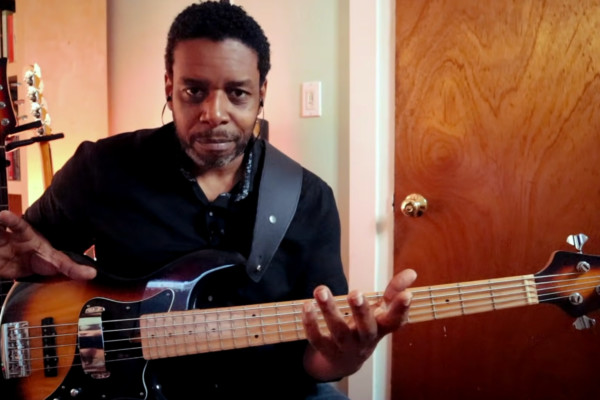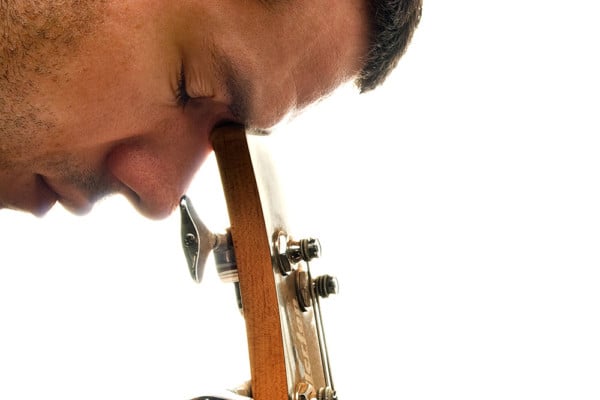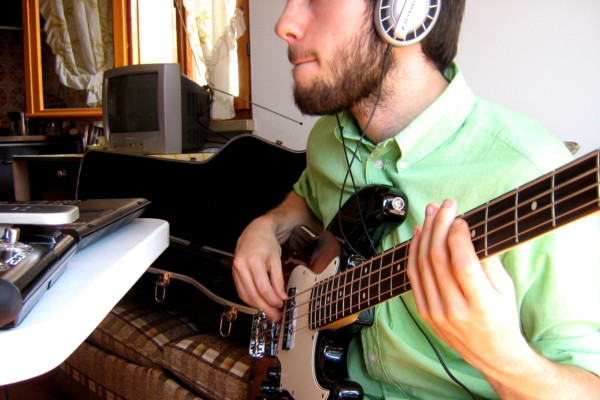Focus and Time
Q: I’ve been playing bass for five years, and I see that bass players that have been playing for three years who are way better than me! I focus on my modes, then on chord structure and then I focus on arpeggios… and it becomes hard for me to get technique down. What do you recommend?
A: It sounds like you feel that there are too many things to focus and work on (or a need to move on to the next thing), so you can’t seem to get a grip on any one aspect.
The reality is that it is all a matter of perception. Some people focus on a million different aspects of music with intentionality (time, tone, feel, chords, scales or modes, technique, etc.), while others focus on only one thing: being able to make music.
There is no real easy answer as it all depends on how you learn and absorb information. The truth is, it’s not that complicated… unless you need it to be.
There is no right or wrong way to play, study or approach music. But there is a way that will get you to what your goals are for the instrument.
So start there: what are your goals for the instrument?
You mentioned people playing for less time sounding better than you. Who are you playing for?
If your goal is to be the most shredding bassist on Youtube then, yeah, focus on technique, facility, finger independence and learn to play “Flight of the Bumblebee” at top speed.
If you want to be able to improvise over jazz changes, then you should practice understanding and utilizing scales, chord shapes and chord tones, chromaticism and transcribe horn solos and analyze the heck out of them in a pursuit to understand why they do what they do.
If you want to have a super deep pocket and be a great funk bassist, learn every James Brown, Jackson 5 and Motown song in the book. Study the bass lines of the greats.
I’ve always wanted to be able to do anything I was asked to do. So I’ve spent a lot of time focusing on all of the above.
There are a few key things to keep in mind:
1. Developing excellence with anything doesn’t happen quickly. You really need hundreds to thousands of hours spent with your instrument in your hand before you will truly own it in one way or another.
That doesn’t mean that you aren’t or can’t make music from day one or two. It doesn’t have to be virtuosic to be fun or have value. The real beauty in playing music for most of us is the feeling we get when making music with others. That is also the quickest way to truly learn what works and what doesn’t.
An hour spent playing music with a friend or peer can often be better than four hours spent sitting on your bed running scales by yourself (in most every way).
2. Do it for yourself and work on those things that you truly want to be better at in your heart. Don’t worry about what Jaco did, what Hadrien can do or what Marcus Miller said you should do. Listen to your heart and your passion and pursue that which you love.
When you do what you love, you will never want to stop. You will play, practice, ponder, live and breathe it all day long and, with that kind of intentionality and passion, you couldn’t possibly not get better.
If you’re running scales because you think you should, but you hate them and don’t retain the information anyway, it’s wasted time!
If you really just want to rock and your teacher makes you run arpeggios over “Autumn Leaves” all day long, you’re wasting both of your time.
If you truly wish that you could blow over “Giant Steps” or trade solos with Janek Gwizdala and not get dusted, then you are fooling yourself by thinking that you could get there by not doing those things for hours and hours.
You simply have to be honest with yourself about what you want to be able to do with the instrument and then work hard to be able to do it. Manage your shed time efficiently and with forethought.
You will be right where you want to be in no time. And you are always right where you should be by virtue of how hard you worked to get there. Just make sure that you walk in the direction you wish to go.
Have a question for Damian Erskine? Send it to [email protected]. Check out Damian’s instructional books, Right Hand Drive and The Improviser’s Path.




I’m in the same spot, I’ve been playing on and off for about almost 5 years and it seems like im never getting any better.
I’ve said to myself that once i find out What i need to practice, I’m going to give it an honest try with an equal amount of practice everyday.
Does anyone have any advice for a guy that wants to get the speed of a metalbassist?
To develop metal style and speed I would recommend simply learning a lot of tunes by guys you admire. Robert Trujillo, Steve Harris, Cliff Burton and a ton of others had pretty incredible right hand speed and articulation. Start with those guys. Slow down their parts and work them up to speed a little bit at a time. PLay along with the guys you love and you’ll start to develop their technical abilities (bit by bit).
Thank you, i will look into that!
But my real problem isn’t my picking hand, it’s my left hand that cramps up just by watching someone play master of puppets or anything like that. I have no idea how to get past this since it happens everytime i try something a bit harder.
It’s all muscle development and endurance. Don’t play past the pain but keep working on it and you’ll get better and better each time. It’s like being able to do situps.. week 1 might only be 10 but before you know if you can do 20, 40, 50, 100, etc… gotta build those muscles!
This is the Place to Start: what are your goals for the instrument? Once you got these written down, you need to make a plan on how to get them done! That includes a Time line! Now the Time line can be adjusted as needed! Plus, what you are working on, should be adjusted as needed. You will get better, as time moves on. Just stick with your plan! :^D
I would just ad this: If you do have a general goal to just be a better player, then make sure to set aside time for reading, scales and just messing around. That way you don’t get caught up just in the technicality of it, or one aspect. Each time you learn a technique or how to work around a chord structure take that new knowledge and write a song around it so you can put it in a musical context to have fun with.